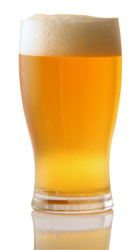
Thin Mash/Thick Mash...
#1

Posted 28 January 2010 - 08:23 PM
#2

Posted 28 January 2010 - 10:18 PM
#3

Posted 28 January 2010 - 11:07 PM
https://www.homebrew...-enzyme-110378/so there are some homebrew world tidbits for you...i really don't have any scientific backing on either of those statementsTry increasing the amount of mash water you are using by 25-50%. Homebrewers tend to mash very thick. I was over at a Fermentation Sciences demo Sunday and they said most of their mashes are 5:1 and they rarely go below 3:1. Dropping from 5:1 to 3:1 costs them about 9% in extraction efficiency.
#4

Posted 29 January 2010 - 05:24 AM
#5

Posted 29 January 2010 - 06:44 AM
#6

Posted 29 January 2010 - 06:58 AM
#7

Posted 29 January 2010 - 07:03 AM
#8

Posted 29 January 2010 - 08:50 AM
#9

Posted 29 January 2010 - 09:15 AM
#10

Posted 29 January 2010 - 09:17 AM
#11

Posted 29 January 2010 - 09:22 AM
5:1 ratio!!! I suspect that is metric or something to kilograms to liters.If it was lbs to quarts, a 10 lb grain bill would be 50 quarts, 12.5 gallons. For a 5 gallon batch the grains absorb ~7 gallons. So we know that aint right.For 10 lbs, I would use 16 quarts, (1:1.6) 4 gallons because it is easy to measure. 9 lbs would be 14 (1 to 1.56). I batch sparge and know I am going to add more water before I drain the mash tun for the first time, so the exact volume of strike is not important.zymotI remember reading one time (i think on here) that a thinner mash means a sweeter beer in the end...then about 2 minutes ago i was looking at another site (google sent me there i swear) and read this:
https://www.homebrew...-enzyme-110378/so there are some homebrew world tidbits for you...i really don't have any scientific backing on either of those statementsTry increasing the amount of mash water you are using by 25-50%. Homebrewers tend to mash very thick. I was over at a Fermentation Sciences demo Sunday and they said most of their mashes are 5:1 and they rarely go below 3:1. Dropping from 5:1 to 3:1 costs them about 9% in extraction efficiency.
#12

Posted 29 January 2010 - 09:50 AM
#13

Posted 29 January 2010 - 09:54 AM
#14

Posted 29 January 2010 - 09:54 AM
If you did a no sparge, 5:1 wouldn't be unrealistic, correct?Zymot: I thought that 5:1 stat was crazy too... there must be more to it, otherwise you'd never have to add sparge water.
#15

Posted 29 January 2010 - 10:13 AM
The only reason I don't use 2qt/lb. is b/c my 28qt. mash tun runs out of space.I find that I get notably better efficiency with a thinner mash. These days I am mashing at around 1.75 to 2 quarts per pound for most beers, in order to take advantage of the improved efficiency.
#16

Posted 29 January 2010 - 10:14 AM
#17

Posted 29 January 2010 - 10:17 AM
OK, I suppose that would work for an Ordinary Bitter, but I don't see how you could make a metric American Wheat.I think the 5:1 is L/kg which equals 2.4 qt/lb
#18

Posted 29 January 2010 - 02:41 PM
Still crazy10 lbs recipe at 75% efficiency into a 5 gallon batch = ~1.050 OG10 lbs at 5:1 = 50 qts or 12.5 gallons.Use .12 gal/lb retention by grains and you have 1.2 gallons.5.5 gallons in you boil kettle, 1.2 gallons soaked into your grains = 6.7 gallons accounted for.12.5 gallons - 6.7 = 5.8 WTF gallons unaccounted for.No way would you use 5:1 (or 1:5) ratio when talking pounds of grain to quarts of water.zymotIf you did a no sparge, 5:1 wouldn't be unrealistic, correct?
#19

Posted 29 January 2010 - 10:05 PM
#20

Posted 30 January 2010 - 07:21 AM
I agree with this. Some German and Czech lager brewers are known to mash at ratios like 2.5 qts/lb. Pilsner Urquell also supposedly has an 8 hour boil.As for the original question about mash thickness, here is the data that I have on how mash temperature and thickness affect fermentability:______0.7 qt/lb_____1.2 qt/lb_____1.7 qt/lb140F____73.3%_______76.1%_______76.2%150F____67.4%_______71.2%_______69.7%155F____64.4%_______65.0%_______65.3%I think the 5:1 is L/kg which equals 2.4 qt/lb
0 user(s) are reading this topic
0 members, 0 guests, 0 anonymous users


















